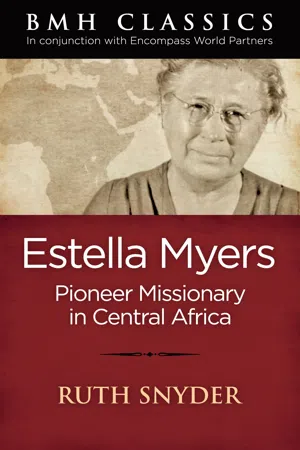
- 167 pages
- English
- ePUB (mobile friendly)
- Available on iOS & Android
eBook - ePub
About this book
Weeding an onion patch, facing an armed witch doctor, traveling the roadless savannas of central Africa were events in the dramatic life of Estella Myers. Miss Myers was a remarkable woman – not only because of her unusual life and her many achievements, but also because the incidents of her story remind us that God can work wonders through one unpretentious life.
Frequently asked questions
Yes, you can cancel anytime from the Subscription tab in your account settings on the Perlego website. Your subscription will stay active until the end of your current billing period. Learn how to cancel your subscription.
At the moment all of our mobile-responsive ePub books are available to download via the app. Most of our PDFs are also available to download and we're working on making the final remaining ones downloadable now. Learn more here.
Perlego offers two plans: Essential and Complete
- Essential is ideal for learners and professionals who enjoy exploring a wide range of subjects. Access the Essential Library with 800,000+ trusted titles and best-sellers across business, personal growth, and the humanities. Includes unlimited reading time and Standard Read Aloud voice.
- Complete: Perfect for advanced learners and researchers needing full, unrestricted access. Unlock 1.4M+ books across hundreds of subjects, including academic and specialized titles. The Complete Plan also includes advanced features like Premium Read Aloud and Research Assistant.
We are an online textbook subscription service, where you can get access to an entire online library for less than the price of a single book per month. With over 1 million books across 1000+ topics, we’ve got you covered! Learn more here.
Look out for the read-aloud symbol on your next book to see if you can listen to it. The read-aloud tool reads text aloud for you, highlighting the text as it is being read. You can pause it, speed it up and slow it down. Learn more here.
Yes! You can use the Perlego app on both iOS or Android devices to read anytime, anywhere — even offline. Perfect for commutes or when you’re on the go.
Please note we cannot support devices running on iOS 13 and Android 7 or earlier. Learn more about using the app.
Please note we cannot support devices running on iOS 13 and Android 7 or earlier. Learn more about using the app.
Yes, you can access Estella Myers by Ruth Snyder in PDF and/or ePUB format, as well as other popular books in Theology & Religion & Christian Ministry. We have over one million books available in our catalogue for you to explore.
Information
Topic
Theology & ReligionSubtopic
Christian MinistryXIV.
STRONG
BECAUSE OF
GRIEF
Our highest joys succeed our griefs,
And peace is born of pain;
Smiles follow bitter blinding tears,
As sunshine follows rain.
We gain our rest through weariness,
From bitter draw the sweet;
Strength comes from weakness, hope from fear,
And victory from defeat.
We reap where we have sown the seed;
Gain is the fruit of loss;
Life springs from death and, at the end,
The crown succeeds the cross.
Author Unknown
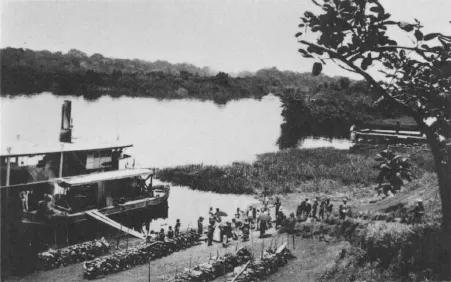
The steamer Djah on the Sanga River.
As they left Camp Wait-Some-More, hope and joy filled their hearts. The door was not open directly to Oubangui-Chari but it had opened as far as Carnot. At Carnot they would be approximately one hundred miles from the goal. So with light hearts they boarded the little river steamer, the Djah. Just the day before they were to leave, Marie Rollier had been taken ill with an attack of fever. In answer to prayer God raised her up, and the next day she was able to board the boat.
The little boat which Estella and her companions boarded that ninth day of September 1919, needs more than passing notice. It offered only two tiny cabins for the passengers and only two narrow bunks in each. The passengers who could not be accommodated in the cabins slept on the deck which served as dining room and lounge by day. Mealtime featured the battle of the bugs. This was especially true of the evening meal when desperate passengers tied their handkerchiefs over the lights in an attempt to lessen the attraction they made for the insect world. Bats swooped across the open deck. Days were hot, nights were sultry. The relentless chug of the engines which grew so wearisome was replaced at night by the droning of frogs. Flying sparks burned holes in clothing. A constant din arose from the barges which were tied to the side of the boat for the use of native travelers. Odors from their cooking-pots offended the nostrils of the passengers on the deck above. Such was the Djah on that memorable day when the pioneers boarded her and were on their way to their goal. This miserable little boat was soon to be host to an important visitor—the angel of death.
On a Tuesday evening the triumphant group boarded the boat which was to take them on their way to Oubangui-Chari. Thursday morning Mary Rollier was not feeling well. That night she went to bed never to rise again. As her fever mounted her sufferings increased. Crowded into the narrow little bunk with scarcely room enough to raise her head, her misery was great indeed.15 On Tuesday, September 16, she realized that the journey would end for her while the rest of the party traveled on their lonely way. With that realization she said, “Only to do the will of God.” Later she reached up her hands and said, “I see Jesus.” It was the last word she could give to them, for soon she was asleep in her Saviour.
The stunned survivors scarcely knew what to do in their grief. To add to this trial Estella, Marie and Mr. Rollier were all sick with fever. But as Estella wrote, “Her death did not take God by surprise, and He made provision for the day of our testing and gave us all grace.” Estella and Dr. Gribble prepared the body for burial. Mr. Gribble and some of the other men made a box for a coffin. The body was then placed in a little boat tied to the side of the Djah, and soberly they went on their way to Ikelemba. A canoe had sped on before them to make preparations for the burial. At the lonely site chosen, a grave was dug by convicts in chains. Mary Rollier, who had hoped to loose the chains of bondage in Africa, never saw this cannibal region where people reputedly built their houses in trees. Here her body was laid to rest as her husband preached the funeral sermon.
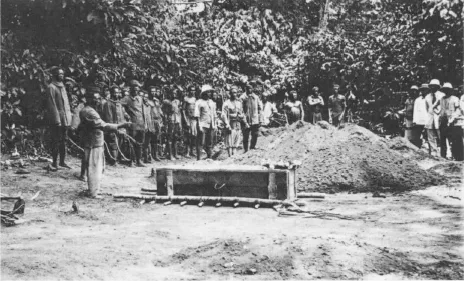
The burial of Mrs. Rollier.
The darkness of the last frontier drew them on their way. On September 19 they arrived at Ouesso. Here the government officials gave them a good house to use until they could leave for Nola. September 24 they started another lap of their journey on the little boat Ngandou. This boat was smaller than the Djah, and because of repeated breakdowns of the worn-out engine, the trip was far from comfortable. However, a pleasant diversion came to them one day. The administrator from Nola was making his way down-river. Seeing the little Ngandou he had his own boat pull alongside. To his surprise and delight there were white passengers aboard the Ngandou. He came on board and visited until late at night with the missionaries. He would have returned to Nola with them if they had agreed to stay there. It was he who discovered that Nola had been written on their papers instead of Carnot. Another mistake had been made and another delay resulted while the correction was made on their papers.
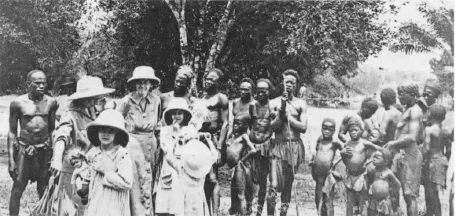
Group along the Sangha River between Ouesso and Nola.
Nola proved to be an interesting place. The administrator provided two good houses for their use, so they were comfortable during this delay. Although the situation of the post at the junction of two rivers made the place beautiful to the eye, it was most unhealthful. There the tsetse fly was found in abundance. Sleeping sickness and malaria were taking their toll of the population.
Government officials wanted the missionaries to remain at Nola to establish a badly needed medical work. Sickness, delay and death had not shaken their brave resolution to go on to their promised land. Neither did the kindness and genuine desire of the administrators to keep them wreck the faith which had not succumbed to hardship.
After six weeks the mistake was corrected on their papers and they were free to go on to Carnot. The administrator from Carnot came to Nola to help them with their next move. This time they traveled on the Mambeli River to Bania.
The journey began to take on a pattern. Each morning they arose, prepared breakfast and lunch and packed their camp for the day. Estella was crowded into the space of one baleiniere (steel barge) with the Gribble family. Mr. Rollier and his daughters were squeezed into another. The baggage and boys were distributed in various other baleinieres or pirogues (canoes). Ten paddlers were used for each boat. All day long this fleet traveled at the breath-taking speed of one mile an hour. It would have been faster to walk but there was no path through the thick underbrush along the river. At night they camped along the shore, pitching their tents for protection.
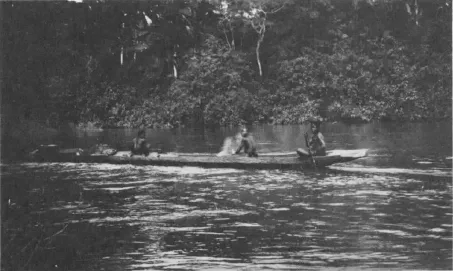
A canoe of the fleet.
While Estella had been nursing at Brazzaville a kind French lady had given her a rooster to provide a meal for the group at Camp Wait-Some-More. Mrs. Rollier had persuaded Estella that it would be more provident to take the rooster with them to Oubangui-Chari than it would be to eat him. Frugal Estella quickly endorsed this idea and so spared her red rooster. They should have named this rooster Cain, for one day to the delight of the camp, he brought home a little white hen-origin unknown. So when they left Brazzaville two chickens went along. Through all the vicissitudes of the journey from Brazzaville the little white hen was a little hen still. At Nola the hen laid her eggs and sat upon them in Estella’s room. Permission was given to move to Carnot. Madame Hen with her eggs under her was placed in a basket. Although the hen and her nest were changed from boat to boat, portered at places, rained upon at times, and burned by the sun, when the group arrived at Carnot, they were the proud owners often chickens.
About two weeks of difficult traveling brought them to Carnot just before noon on Sunday, November 23. Once again the officials gave them residences to use until they found other quarters in the house of a commercial company. When this house was needed, a house of poles was constructed for them. Carnot had been a field of battle between the French and Germans during the war. Unburied corpses had given the leopards a taste of human flesh, so the house of poles was designed to protect them from prowling leopards. Now they pitched their tents inside their house of bars and began the battle of Carnot.
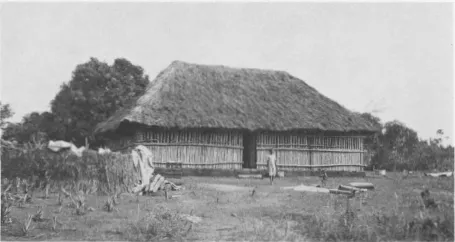
House at Carnot.
God’s love dropped a veil over the future. They could not know it but 1920 was to be their hardest year. Sickness claimed one after another. They had believed that the tsetse fly and malaria-carrying mosquito (anopheles) were not endemic to this region. This belief proved to be but wishful thinking, and one after another went down with malaria.
At Carnot, financial difficulties were experienced for the first time. It was hard to cash checks here in the little outpost so far from civilization. Everything which they could gather up was bartered for food. Thread, salt, hairpins, cloth—all were going for food. One day there was no milk for the children. Now the chickens the little white hen hatched were put up for barter. A trader of the Hausa tribe agreed to give one quart of milk daily for a month in exchange for one chicken. Our hearts are hushed with awe as we think of Mrs. Rollier back in Brazzaville sparing the red rooster from the pot. So God used the instincts of the mother to supply food for her little ones when she herself had gone from them. And Estella, who had cared for the hen in her own room, gave her chickens gladly that the three little ones might have milk. When the table got bare, a gift of vegetables from the administrator’s garden arrived (the missionaries were not allowed to plant a garden). At holiday seasons the administrator invited them to his own table, where the delicious food served so efficiently was refreshing to the band which was encamped at Carnot.
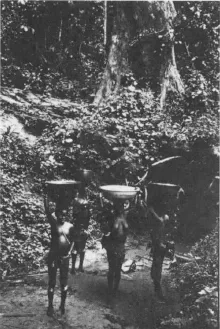
Spring at Carnot.
Satan was opposing the pioneers in every possible way. They had been busy learning the language of the Baya tribe. At Carnot they were in the midst of a Baya district. They believed that their future work would begin among this tribe. When enough of the language was learned to permit them to talk, they began preaching to the people. Their activity soon drew the attention of the witch doctors.
One day as Estella was preaching, she noticed a witch doctor among the crowd of listeners. It was not hard to identify him, for his frightening appearance, his garments of animal skins, his weighty ornaments and spear all revealed his craft. As she watched this man he withdrew from the crowd. Soon he returned with a knife in his hand, and drawing closer to her he pulled the knife out of its sheath. She did not move but quickly breathed a prayer for courage. Several feet before he reached her, he dropped the knife and extended his now empty hand to shake hands in the fashion the natives had adopted from the white people. To her further amazement he greeted her in the Baya language. She returned his greeting, whereupon he turned and walked away. Estella continued talking to the people who no doubt had watched this drama with great interest and suspense.
The officials added a burden to those troublesome days. In every way they were personally kind to the missionaries and thoughtfully provided for their welfare, but there was no sympathy in their hearts for the work of the missionaries. Estella and Dr. Gribble were busy with medical work. Often they treated one hundred patients daily. This activity met with the full approval of the administrator. In fact he himself went to Estella to have a tooth extracted. He was grateful for this service and rewarded her handsomely. Her diary under date of May 22, 1920, states, “I received spoon and fork from Mr. Pinelli in ivory for pulling his tooth.” This was an exchange of ivory which pleased them both, no doubt.
This same Mr. Pinelli assured the missionaries that he liked them personally and approved of their medical work, but he did not want them to disturb the minds of the natives with talk of religion. He threatened the natives as to what he would do to them if he caught any of them listening to the preaching. But the preaching continued. One day the blow fell. All the missionaries were called to see the administrator. They were to be dealt with officially for disregarding the oft-repeated warning against preaching. Each was to answer individually to the charges.
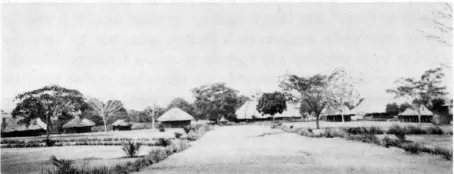
Government station at Carnot.
Estella was the first to be called before the bar in that mud courthouse at Carnot. She was asked if she would promise not to mention the name of Jesus Christ before the Africans. Her soul cried, “All thy billows and thy waves passed over me.” Standing there that day the memory of their sore trials tortured her. She could not promise to leave off mentioning the name of the One Who had brought them thus far on their way. She must tell of the love of Jesus. She burst into tears. The embarrassed Frenchman dismissed them until another day which never arrived. The girl who thought she had only hands with which to serve the Master discovered that she also had tears which could be used for Him.
As they were returning to the camp after this dramatic trial, a lad came running toward them. “Are you the people with the Good News?” he asked. They told him that they were the people for whom he was hunting. This young lad, they discovered, had left his home village and traveled two days to find them. He wanted to hear all their wonderful message so that he might return to his village and tell it to the people there. Ah, what if they had yielded! But God had preserved them from disaster. Estella forgot about her humiliation before the administrator. Her heart sang, “I will praise thee, O Lord my God, with all my heart. And I will glorify thy name for evermore.” It was God Who had held her steady and used her tears to dismay the courteous Frenchman.
The war of personalities between Estella and the official was not yet over. In March of that year Estella and Dr. Gribble were interned for preaching in the villages. “Thou wilt keep him in perfect peace, whose mind is stayed on thee: because he trusteth in thee,” was God’s message to them now. It is easy to confine two white women to a limited area, but to keep the Africans from entering any forbidden area is far more difficult. The people continued to come to the restricted area of the little camp, and in spite of threats of imprisonment they came again and again. But strange to say, as the missionaries were talking to the people, suddenly their audience would disappear. The observant natives had spotted the administrator’s horse in the distance! When the horse and his rider were no longer in view the audience returned to listen again to the Good News. March to July passed in this fashion.
July 14 is the most important holiday of the French calendar. On that day the Bastille was stormed and taken by the citizens of France during the revolution. The internment given to Estella and Dr. Gribble was not to be compared to the severity of imprisonment in the Bastille,...
Table of contents
- Cover Page
- Halftitle Page
- Title Page
- Copyright Page
- Table of Contents
- I. Strong Because of Father
- II. Strong Because of Home
- III. Strong Through Effort
- IV. Strong Because of School
- V. Strong Because of Suffering
- VI. Strong Because of Training
- VII. Strong Because of Example
- VIII. Strong Because of Challenge
- IX. Strong Through Preparation
- X. Strong Because of Trial
- XI. Strong Because of a Voice
- XII. Strong Because of Hope
- XIII. Strong Because of Waiting
- XIV. Strong Because of Grief
- XV. Strong Because of Victory
- XVI. Strong Because of Fulfillment
- XVII. Strong Because of Experience
- XVIII. Strong Because of Labor
- XIX. Strong Because of Vision
- XX. Strong Even in Death